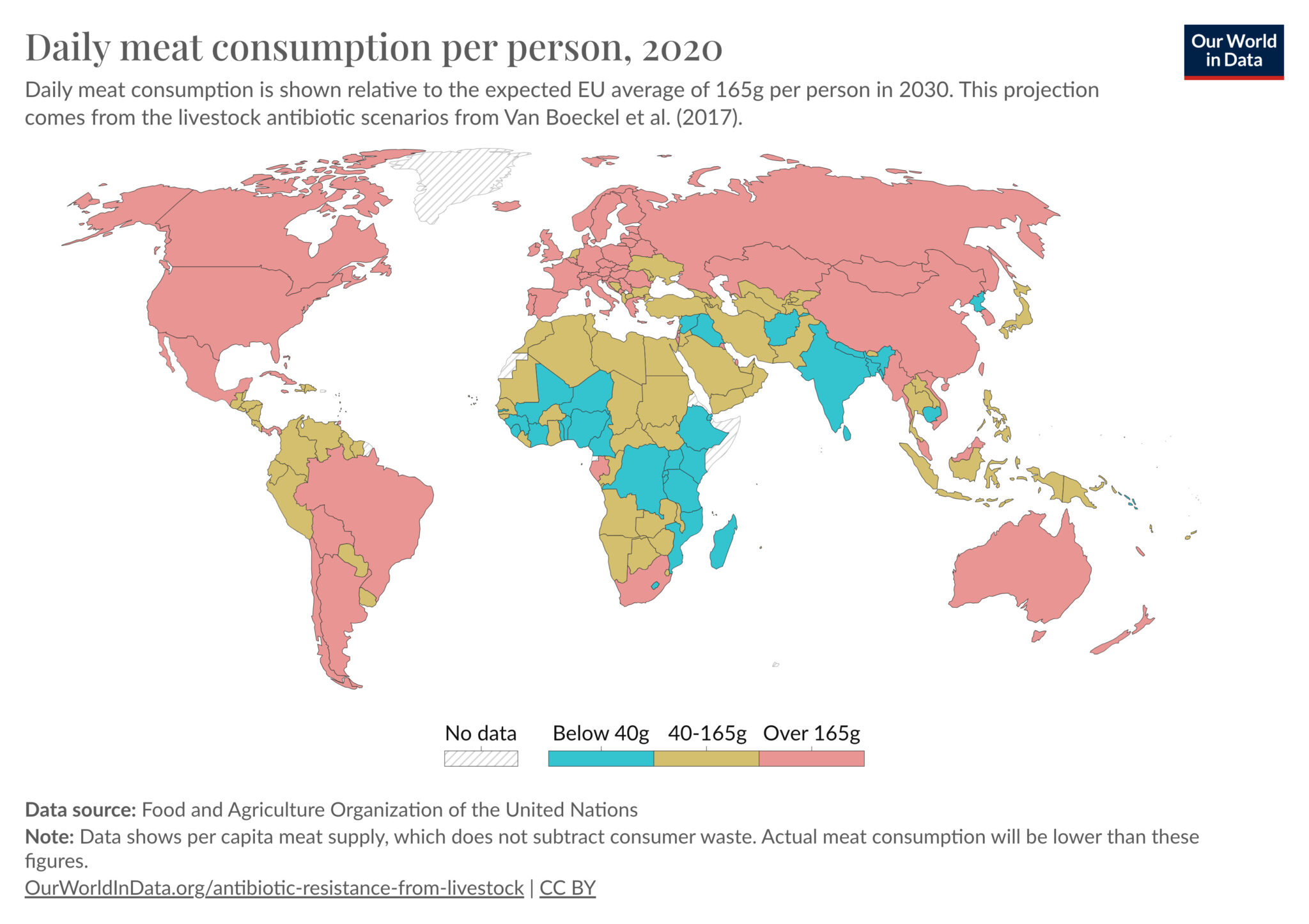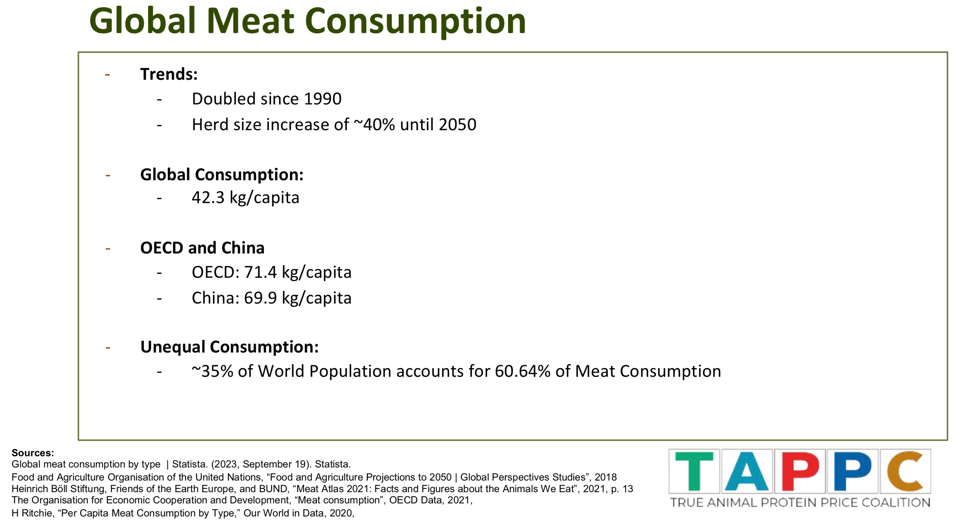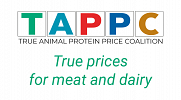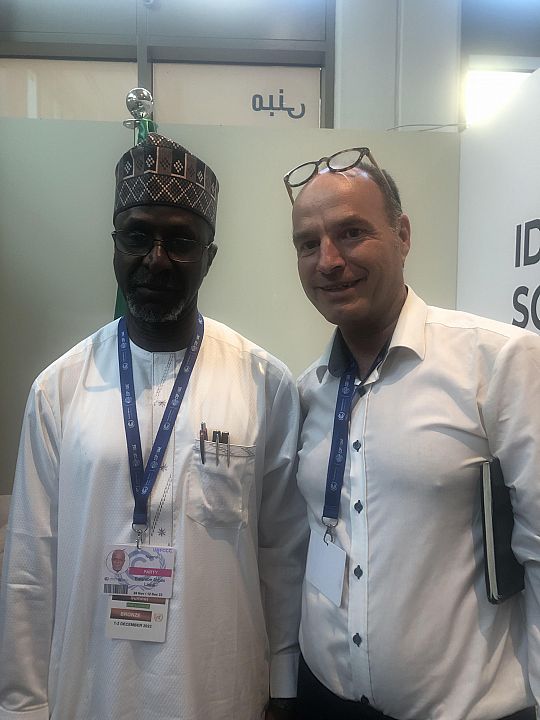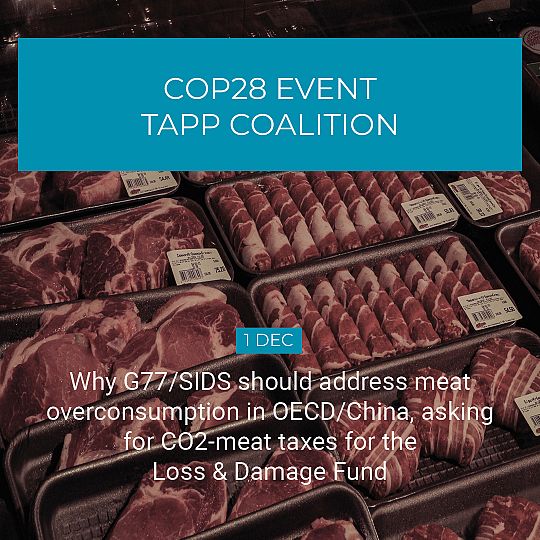African countries urge rich countries to start GHG-emission food taxes
Press release 9th December 2023
Environmental Ministers of Nigeria, Uganda and the Republic of Congo, representing 30 percent of African inhabitants, signed a letter, sent 10th December to Climate Ministers of 38 rich OECD countries and China, urging them to start policies to reduce meat consumption. This should include fiscal incentives like GHG-emission taxes on food, livestock, meat-taxes, or Agri-ETS systems that generate income for the new Loss and Damage Fund. In the letter signatories say to ‘consider not to sign any COP agreement unless concrete actions will be committed by rich countries and China to address these issues.
One of the signatories is Abbas Lawal Balarabe, Minister of Environment Nigeria, who said to ask more African countries to sign the letter. Nigeria.
Different African countries and many other G77 countries, including India, did not sign the COP28 UAE Agriculture Climate Declaration that was signed during the COP28 conference by 158 countries. This might be a signal countries who did not sign were dissatisfied with the COP28 Declaration. This Declaration is not focused on the responsibility of rich countries and China to reduce their GHG emissions from meat and dairy (over)consumption. OECD countries and China represent 35 percent of the global population, but they consume over 60 percent of global meat supply. They eat nearly two times more meat per capita compared to the world average. Meat and dairy consumption now cause up to 20 percent of global greenhouse gas emissions according to a recent UNEP publication.
It’s a pretty well-known fact that rich countries eat too much meat. In the US, people consume 127kg of meat per year, while in Australia, that figure stands at 120kg. Canadians eat 90kg each year, and Spaniards consume 100kg.
According to the Eat-Lancet Commission, we should limit our annual meat intake to 15.7kg to keep in line with our climate and health goals – this means meat consumption is around eight times higher than the recommended amount in the US and Australia, and over six times more in Canada and Spain.
In contrast, many developing nations tend to eat much less meat – for example, 7kg per year in Nigeria, 3kg in the Democratic Republic of Congo. We also know that food systems account for a third of all greenhouse gas emissions and that meat makes up 60% of total food emissions. The problem, then, is one of inequality – the Global North is responsible for 92% of our excess emissions, but 91% of all deaths related to extreme weather occur in developing countries, which are mostly in the Global South.
One month before the COP28 meeting TAPP Coalition sent the draft letter - urging OECD countries and China to eat less meat - to all Climate ministers of G77 low income countries and small island states (SIDS countries), with a request to sign. It seems they recognize that eating meat and dairy in huge amounts, like rich countries and China do, leads to loss and damage, especially in low income countries: sea level rise, floods, extreme heat and loss of harvests. If China and OECD countries would tax meat with 10 dollar cent per 100 gram, it could generate 147 billion dollar annually, that could be used too for the Loss and Damage Fund. Scientists say an adequate fund for addressing loss and damage would need to be around $380 billion annually by 2025. During the COP28 $726 million is pledged, after UN countries agreed on a historic agreement at day one of the COP28, to operationalize the Fund. France and Kenya work together to find tax mechanisms that help capitalize this Fund. Taxes on meat can be part of them.
The call for meat taxes in high income countries becomes stronger every year and was also heard clearly at COP28. Such taxes help to advance the transition towards healthy, plant-based, low-carbon-emission diets. More and more global institutes endorse the call made by the TAPP Coalition, advocating for considering greenhouse gas emission taxes on food. According to the third IPCC report (AR6III), such taxes are recognized as policy options with great transformational potential regarding mitigation efforts, positive environmental effectiveness, and low implementation costs. The German, Dutch, Danish and New Zealand Agriculture Ministers studied the best way to tax meat or livestock. The EU Commission launched a new report 13th November with scenario’s for an Emission Trading Scheme for GHG-emissions in agriculture and food, concluding slaughterhouses and dairy factories are good candidates for the ETS system.
Jeroom Remmers, director of TAPP Coalition, a group of 60 food companies, farmers-, youth- and NGO organisations in Europe and the USA, said: “We promote GHG emission taxation on meat and dairy, ETS systems or carbon pricing in the agri-food sector, using tax revenues for several purposes. We see many benefits:
1. The fastest way to reduce GHG emissions from the sector in line with the Paris Climate Goals, because of the financial incentives for consumers and producers. A meat tax at EU level reduces 3 percent of total EU GHG emissions by 2030 (120 Mton/year) and 40 percent of food related emissions.
2. The cheapest way of realizing GHG-emission reductions overall. A Dutch think tank PBL calculated in 2008 that if high income countries would half their meat consumption levels (by taxation), global climate costs can be reduced by 50%. This means meat taxation also contributes to poverty reduction in many countries. It can save climate finance in other sectors with much higher costs per ton CO2 reduction. One of the co-authors was Bas Eickhout, now leading Green Climate MEP in the European Parliament.
3. Taxation or ETS systems generate revenue that can be used for 1. Paying farmers to reduce GHG emissions, 2. Reducing taxes/prices on food with low climate footprints such as vegetables 3. Compensating low income groups.
4. GHG emission pricing of agri/food generates income for climate finance for the Loss and Damage Fund. If OECD countries and China start a tax on meat with 10 dollar / euro cent per 100 gram meat, the tax revenue is 147 billion dollar annually.
5. It will reduce external costs to societies, not only for climate emissions but also other environmental problems, biodiversity loss and health care. FAO reported these hidden costs are 10 trillion dollar per year, 10% of global GDP. Internalising these externalities will reduce these damage costs. Food will become more expensive overall but health care costs and climate damage will decrease. So it will save a lot of costs too (net benefit to society).
6. If high income countries and China do not start taxing meat/dairy or have ETS Systems on agri/food soon, G77 countries like Nigeria and other African countries will not sign COP agreement anymore, see this letter that will be sent 10th December 2023 to OECD and Chinese Ministers”.
What do the signatories and TAPP Coalition expect from week 2 at COP28?
We believe COP28 can only be successful if:
- It includes meat consumption reduction policies in the center of programs for reducing emissions before 2030 (e.g. Methane Pledge), mitigation, climate finance, Loss and Damage, retail and meat industry pledges, especially in OECD countries and China.
- It includes meat consumption reduction policies in the climate-health ministerial at COP28, since reducing the (over)consumption of meat in OECD countries and China has public health co-benefits.
- It includes global and national meat consumption reduction commitments for OECD and China, and the need for carbon pricing mechanisms for meat production or consumption in the COP28 Head of State and government-level declaration for Food Systems, Agriculture, and Climate Action.
- It asks the OECD, the Carbon Pricing Leadership Coalition, G20, China and the EU Commission to lead the way towards harmonized carbon pricing in food-systems starting with meat.
- It considers using the revenue of food-system GHG-emissions taxes in OECD countries and China, to fund at least 15-20% of climate finance for the Loss and Damage Fund.
Procedure for more signatures:
Non-OECD countries can sign the letter by filling in this form and by sending an email to info@tappcoalitie.nl with the name and title of the Minister.
Not for publication:
The letter to OECD/Chinese Ministers can be read here:
French translation of the letter can be found here.
Background Info: https://www.tappcoalition.eu/nieuws/21234/oecd-countries-and-china-urged-to-reduce-meat-consumption-at-cop28.
More info: our four last COP28 news items about press conferences and side events: https://www.tappcoalition.eu/nieuws
Our last side event 9th December with FAIRR and FAO, see YouTube: https://www.youtube.com/watch?v=5fKMCN4NgbM
Jeroom Remmers, Director TAPP Coalition
Founder Carbon Pricing Food Coalition
phone: 0031 6 22 40 77 12
Meat facts:
